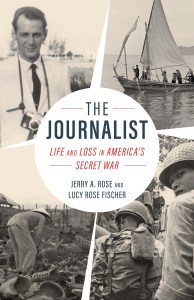“I was at a conference and I heard somebody speaking about their experiences a soldier in Vietnam, and I knew that my sister in law my brother’s widow, had, had collected in and had stored all his journals and letters and other writings. I knew there was just this treasure trove of material.”
Jerry Rose was killed in Vietnam in a plane crash in September 1965, on his way to inspect refugee camps. He had been in a creative writing Ph.D. program and tried journalism “for a lark,” Fischer said.
 “He went to Vietnam to gather material for writing and art, and to expose himself to interesting experiences,” she said. “He met many journalists, and one of his friends was leaving to go back to the States and asked if he wanted to take over his position with Time-Life. He was really good [at journalism] and did that for almost four years.”
“He went to Vietnam to gather material for writing and art, and to expose himself to interesting experiences,” she said. “He met many journalists, and one of his friends was leaving to go back to the States and asked if he wanted to take over his position with Time-Life. He was really good [at journalism] and did that for almost four years.”
After reporting on the war, Fischer said her brother worked as an adviser to his friend, who was the prime minister of the country.
“I knew that his story would be really interesting,” she said, “and also would give a different perspective on the American Vietnamese war, because he was there witnessing at a time when it was just being built up when there was a lot of secret commitments that were being made that other people didn’t know about, that Americans back home didn’t know about. And his job was to kind of ferret out what was going on.”
Fischer said that she made the intentional decision to make her brother the first author of the book and herself the second author.
“I used his material and I felt like I was writing a book that he would have written,” she said. “But it was really co-authored; there was lots of it that I wrote because I had to fill in a lot. There are all sorts of gaps, there’s lots more material than I didn’t use, and, and then lots that I needed to sort of reconstruct what must have happened. There might have been one sentence about something happening. And I had to make a chapter about what actually what that dialogue was what so it was, I call it creative nonfiction.”
The book is Fischer’s sixth that she has written. She has a background as a sociologist and has a Master’s degree in Asian studies. The first three books were academic works and then started focusing on art and creative writing.
Fischer said that the book is also an ode to journalists and the often dangerous work that they do – including the estimated 130 who died covering the Vietnam War.
“Journalists today are under siege,” she said. “The work he did as a war correspondent is dangerous work. It’s a risky profession and we need to not lose sight of the important work that journalists and journalism are all about.
“But it also gives a perspective on that historical period. It’s an interesting story. An adventure story. A love story.”

